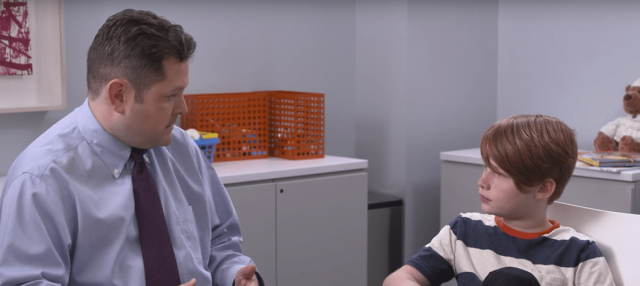Ask an Expert
Is dysgraphia acknowledged by schools?
Clinical Expert: Adam S. Zamora, PsyD
en EspañolMy granddaughter has always had a hard time forming letters. Some teachers thought she was being messy because she was lazy and insisted she do work over. Now she's in high school and some teachers still mark down for insufficient neatness. We were just delighted when her work was legible. Is dysgraphia acknowledged by schools and psychologists?
Dysgraphia is still acknowledged by psychologists. For schools the answer is a little more complicated. Issues with neatness are often seen as carelessness or laziness and rarely seen as related to something like dysgraphia. So kids get “dinged” for something that is inherently harder for them and not necessarily within their control.
To add to the complexity, dysgraphia is no longer considered a diagnosis on its own according to the DSM-5, which is the official diagnostic manual used in the field. Even if an evaluation determines that a child has dysgraphia, the school may or may not recognize that as a type of impairment that warrants specific supports in place. Schools use their own classifications like “Learning Disability” or “Speech or Language Impairment” that sometimes align with diagnoses that psychologists give out, but not always.
But there is still hope for getting help in school. That’s because kids who have classic dysgraphia often also meet diagnostic criterial for “Developmental Coordination Disorder” or “Specific Learning Disorder, with impairment in written expression.” These diagnoses are included in the DSM-5, so schools should provide services and accommodations to support these challenges.
This might be confusing, so here’s a little more background. Classic dysgraphia impacts the motor aspect of writing, but many kids with dysgraphia also struggle with other things. For example, children with dysgraphia often have a hard time with what’s called “written expression,” which means the act of generating ideas in written form. If you think about it, writing is one of the most complex things we’re asked to do in school — it involves figuring out sentence structure and order and using the right punctuation and spelling in addition to forming the individual letters. Kids with dysgraphia might have great ideas, but getting them down on paper clearly, and with the correct spelling and punctuation, can be tough.
Dyslexia and ADHD can also accompany dysgraphia. So on the surface it might look like a child just has “bad handwriting,” — and this is how teachers might interpret it — but she actually needs support on multiple fronts.
So if your granddaughter hasn’t had an evaluation yet, getting one could possibly unlock accommodations for her in school. A neuropsychological evaluation comes with data and recommendations for appropriate accommodations. So for your granddaughter that might mean not being marked down for issues with neatness or spelling. Or allowing extra time for any kind of writing assignment, which helps kids translate their thoughts onto the paper. Another recommendation could be letting kids type out longer written assignments so they can communicate their ideas more fluently.

Was this article helpful?
Related Reading
-
 Inside an Evaluation for Learning Disorders
Dr. Matthew Cruger walks us through the process
Inside an Evaluation for Learning Disorders
Dr. Matthew Cruger walks us through the process
-
 Supporting the Emotional Needs of Kids With Learning Disabilities
Signs your child might be struggling with low self-esteem, anxiety, or depression, and how to…
Supporting the Emotional Needs of Kids With Learning Disabilities
Signs your child might be struggling with low self-esteem, anxiety, or depression, and how to…
-
 Tips for Recognizing Learning Disorders in the Classroom
Characteristics of learning disabilities that can hide in plain sight
Tips for Recognizing Learning Disorders in the Classroom
Characteristics of learning disabilities that can hide in plain sight
-
 Understanding Dysgraphia
How to help kids who struggle with learning to write
Understanding Dysgraphia
How to help kids who struggle with learning to write
-
 Quick Guide to Dysgraphia
Dysgraphia is a learning challenge that makes it difficult for children to write. Kids with…
Quick Guide to Dysgraphia
Dysgraphia is a learning challenge that makes it difficult for children to write. Kids with…
-
 When Problem Behavior Masks a Learning Disability
How to tell if a child who’s acting out actually needs help in school
When Problem Behavior Masks a Learning Disability
How to tell if a child who’s acting out actually needs help in school
-
 What Is Social and Emotional Learning?
How SEL programs help kids succeed in school
What Is Social and Emotional Learning?
How SEL programs help kids succeed in school
-
 Anxiety, ADHD and Autism: Sam’s Extraordinary Childhood
“I had no idea what his future held. He could just as easily invent the…
Anxiety, ADHD and Autism: Sam’s Extraordinary Childhood
“I had no idea what his future held. He could just as easily invent the…
-
 How to Spot Dyscalculia
When math difficulties mean something more
How to Spot Dyscalculia
When math difficulties mean something more
-
 Mindfulness in the Classroom
How it helps kids regulate behavior and focus on learning
Mindfulness in the Classroom
How it helps kids regulate behavior and focus on learning
-
 What Are the Different Kinds of Learning Disorders?
How they’re recognized and diagnosed
What Are the Different Kinds of Learning Disorders?
How they’re recognized and diagnosed
